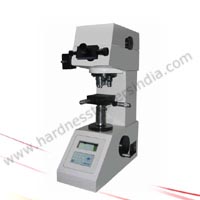

We M.M. Engineers are leading Manufacturers, Suppliers, Providers, Traders, Wholesaler, Dealer, Services, Spare Parts of Hardness Tester Calibration. Calibrating a hardness tester is a crucial process to ensure the accuracy and reliability of hardness measurements. Calibrating the tester involves comparing its readings to a set of known standard values, and adjustments are made as necessary to correct any deviations. Proper calibration is essential for maintaining the quality of testing results and ensuring compliance with industry standards and specifications. The primary advantage of calibration is that it ensures the accuracy and reliability of hardness measurements. By comparing the tester's readings to known reference values, any deviations or errors can be identified and corrected. This accuracy is essential for quality control, material characterization, and product performance assessment. Many industries have specific standards and specifications that require hardness testing. Calibrating the hardness tester ensures that the measurements align with these standards, ensuring that products meet regulatory requirements. Calibration helps maintain consistency in hardness measurements over time. Consistency is crucial for quality control and ensuring that products meet consistent quality standards. Calibrated hardness testers provide confidence in the quality of materials and products. This is especially important in critical applications where the reliability and safety of the end product are paramount. Calibrating the hardness tester helps prevent errors that can lead to costly mistakes or product recalls. It can save money by reducing the likelihood of producing defective parts or components.
Calibration establishes a traceable record of the hardness tester's performance. This traceability is essential for demonstrating the validity and accuracy of hardness measurements in audits, inspections, or legal disputes. Calibration contributes to better process control by ensuring that hardness measurements are consistent and accurate. This helps identify potential issues early in the production process, allowing for timely adjustments or corrective actions. Calibration reduces measurement variability, leading to more consistent and predictable hardness measurements. This consistency is crucial for assessing material properties and making informed decisions. Regular calibration can help extend the lifespan of the hardness tester by identifying and addressing issues before they cause significant damage or wear. In applications where hardness testing plays a role in safety, such as the aerospace or automotive industries, calibration ensures that materials and components meet the required safety standards. Calibration of hardness testers enhances customer confidence by demonstrating a commitment to quality and precision. It can be an essential factor in securing contracts and maintaining customer relationships. Calibrating hardness testers helps maintain data integrity by ensuring that hardness values are accurate and can be relied upon for decision-making. In some industries, regulatory authorities require calibrated testing equipment as part of quality management systems. Compliance with these regulations is essential to avoid penalties or legal consequences. n summary, hardness tester calibration is a critical process that provides numerous advantages, including accurate measurements, compliance with standards, quality assurance, cost savings, and enhanced safety. It is an essential component of quality control and ensures that hardness measurements are trustworthy and consistent, benefiting a wide range of industries and applications. We M.M.Engineers are deeply engaged in offering a wide array of Hardness Tester Calibration to our valuable Clients located in Mumbai, in Navi Mumbai, in Thane and all over India.
